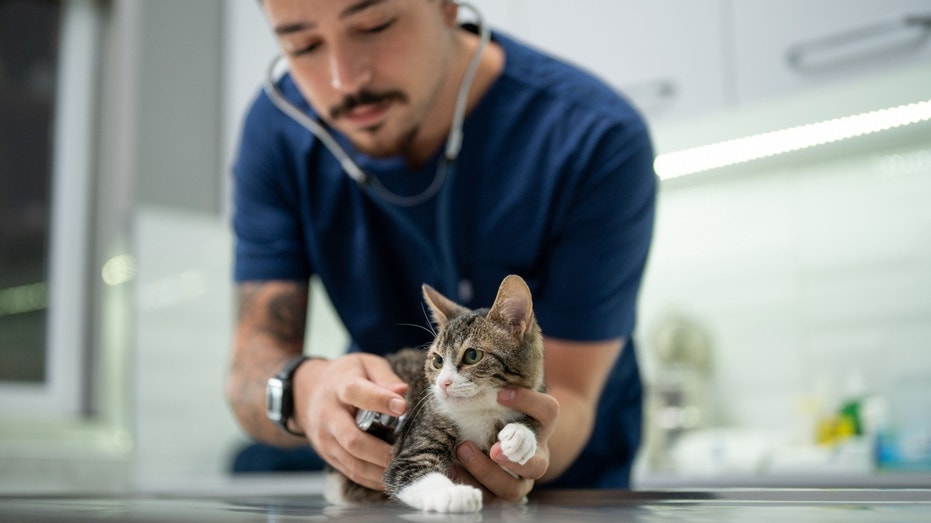
NYC Second Chance Rescue co-founder Lisa Blanco says lots of kittens are looking for their fur-ever homes this summer.
If you’re the owner of a pet, it may make financial sense to purchase pet insurance to cover medical expenses.
“Pet insurance is a lot like your own health insurance, although it primarily covers unexpected health events,” Brian Jorgensen, head of pet insurance at MetLife, tells FOX Business. He says typical coverage includes unexpected accidents (broken bone, an ingested foreign object, etc.), unexpected illnesses (e.g., viral infections, parasites, dental diseases), medications, lab work (blood tests, X-rays, etc.), emergency exams and surgeries, hospital boarding and alternative therapies.
“Because every pet has unique health needs, plans and average monthly costs vary due to several factors. In calculating monthly premiums, insurance providers consider a pet’s age, breed, and location, and most consider pre-existing conditions,” Jorgensen says.
To keep your pet healthy, Dr. Heidi Cooley, a veterinarian with the Banfield Pet Hospital in Vancouver, Washington, says preventive care is important for pets of all ages.
PET-FRIENDLY PRIVATE JET FIRM AIMS TO MAKE TRAVEL WITH DOGS AND CATS EASIER: ‘COST IS COMPARABLE’
“It can help with the prevention and early diagnosis of diseases,” she says. “It can also be cheaper to prevent a problem than it is to fix it. Pet owners should talk with their veterinarian about how often they should bring their pet in for comprehensive exams.”
Why is pet insurance recommended?
Jorgensen says pet insurance is a proactive approach to pet parenting in our current world.
“It’s important to be prepared for the inevitable vet visits – both regular and unexpected – which are increasing in cost,” he says.

A person pets a Labrador retriever in a park. (iStock / iStock)
In fact, in the U.S., he says, a pet receives medical care every 2.5 seconds, and one in three pets needs emergency veterinary treatments every year, according to MetLife Pet Insurance.
“In case something does happen, pet parents can depend on pet insurance to keep costs manageable so they can receive the care they need,” adds Jorgensen.
How can pet insurance be a lifesaver for the pet and family?
When an emergency strikes, it’s easy for the incident to quickly snowball and become a bigger health issue – which ultimately can impact the pet’s well-being and the pet parent’s wallet, Jorgensen tells FOX Business.
“Investing in a pet insurance policy can help give pet parents peace of mind when it comes to dealing with their pet’s health expenses,” he adds.

A pet Macaw perches on a ledge. (iStock / iStock)
MOST PET OWNERS SAY THEY’D PAY EXTRA TO BRING ANIMALS ON A PLANE: SURVEY
Also, having pet insurance makes it easier for pet parents to say “yes” to preventative services and treatments for their pet’s health.
“Those without pet insurance might feel these procedures aren’t necessary if their pet acts and looks healthy – especially given the extra cost – but these proactive exams can be a lifesaver in detecting early conditions for larger health concerns,” continues Jorgensen. “Pet parents can look for a pet insurance policy that offers these extra benefits, like MetLife Pet Insurance’s optional wellness add-on, to help cover the cost of procedures such as spaying and neutering, teeth cleaning and heartworm.”
How can owners justify the monthly premiums if their budgets are already tight?
If pet parents’ budgets are already tight, it’s true that the monthly premium might feel like an added cost, but just consider how one unexpected accident might result in a $5,000 vet bill, he says.
“A small monthly premium payment can save pet parents thousands of dollars on vet bills, but most importantly, help keep their pets happy and healthy for the long term,” says Jorgensen.
When does it make sense to purchase pet insurance?
It may seem easy for pet parents to pass on pet insurance when their furry family member is young, energetic and healthy, but it is actually the best time to start protecting their pet.

Dachshund puppies sleep next up to each other. (iStock / iStock)
TRAVELING WITH A PET? TSA ADVISES THE BEST WAY TO GET THROUGH AIRPORT SECURITY
“Those with young to middle-aged pets may find that pet insurance is especially great for them, as it can help mitigate the costs of treatments for any health issues that arise throughout the course of their pet’s life,” says Jorgensen. “Unfortunately, once a pet develops health issues, many pet parents end up too far down the path of vet trips and bills and regret not getting pet insurance sooner – I promise you, you don’t want to be that person,” he adds.
Is pet insurance always recommended?
Considering that one in three pets requires emergency treatment every year, pet insurance is almost always a good idea, reports Ivana Crnec, DVM at Veterinarians.org.

A vet examines a kitten with stethoscope in a clinic. (iStock / iStock)
“Pet insurance is particularly useful if your pet’s breed is prone to certain genetic conditions, such as hip dysplasia, hypothyroidism, bloat, diabetes, eyelid abnormalities, etc.,” Crnec tells FOX Business.
GET FOX BUSINESS ON THE GO BY CLICKING HERE
In some instances, pet parents may consider not taking out a pet insurance policy.
“The only two situations in which it does not make sense to get insurance are if the dog is too old or already has a serious condition,” Crnec says.
For example, she says, if your pet is diagnosed with cancer, getting insurance after the diagnosis is made will not cover chemotherapy.







